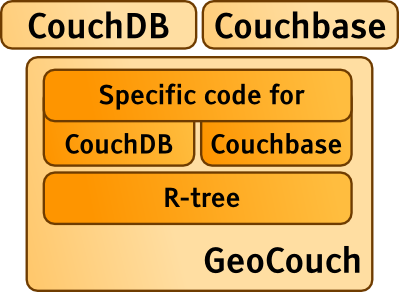2011-05-29
22:35
The WhereCampEU 2011 is just over now, so it's time to get my impression and notes from the sessions written down. But first I'd like to thank all the organizers and attendees for this great event and the geobeers in the evenings.
Geo Databases
The WhereCamp is also a chance to meet people you haven't seen for a long time. Exactly this was the case with Shoaib Burq. We know each other from being a member of the FOSS4G 2009 organizing committee.
As there were still a few free slots, we decided to make session that is simply called "Geo Databases". I didn't expect many people to show up, as there were other sessions with way catchier names.
I ran late as I didn't find the room where my session was supposed to be. But luckily Shoaib was already presenting a rough outline on what will be talked about (we haven't talked about what we want to do upfront). So I happily joined the crowd and started to moderate things a bit. And it was just amazing, the room was packed with people even sitting on the floor. A rough guess would b,e that it was half of the attendees.
We discussed a bit about one of my favourite topics, the question of how much should be done within a geospatial database and what should be done outside of it. It then led to the problem that doing a lot within the database is easy (and fast) on a single instance, but as soon as you want to distribute your database, you might get into trouble.
To conclude, the atmosphere was good and people seemed to have enjoyed it (at least some were telling me so :) I'm happy that it went this well. Shoaib has kindly taken some notes and put on Github.
Web Mapping Libraries
On the second day the program wasn't as packed as on the first day, so I decided to make another session called "Web Mapping Libraries". The Again I didn't expect too many people to show up and this time I was right. It was a good crowd nonetheless.
What I wanted to find out was why people create new web mapping libraries instead of just improving existing ones like OpenLayers. This was also triggered by Slide 54 from Peter Batty's talk, where he compares OpenLayers to Google Maps. The two things that were catching my attention were "lightweight" and "extra mobile features". Those two can be solved. Eric Lemoine demonstrated a 29KB (gzipped) version of OpenLayers including the mobile features that were added at the Lausanne Code Sprint.
In the session it was just great to hear the impressions for what I call "web neogeo people" (people are web developers, designers and general people that like to visualize data) as opposed to "old school GIS people" (that know all kinds of OGC standards and dream about the axis confusion at night).
Things we've identified were (photo version):
- Documentation
- Default Look
- Usability
- Examples are not good
- No explanation of the general architecture
Documentation
The main source of documentation are the API docs. They describe every function of the library. One problem is that it isn't really clear what exactly you can pass in when one parameter is an options object (Example.
The lack of documentation with a nice introduction was also mentioned. Though I don't fully agree, there is some really nice documentation in prose, but it seems that people easily miss it (I especially like e.g. the page about Spherical Mercator).
Default look
I agree that the default look of OpenLayers looks a bit out dated. The main buttons look like from the early 2000's and the layer switcher isn't nice either.
On the one hand, you can change the look if you want to (example (scroll down)), or code the controls with any UI library you'd like to use (this is what GeoExt/MapQuery does).
Usability
I'm not really sure what this one was about, but I think it was about the complexity of OpenLayers. You need to have quite a bit GIS knowledge before you can get started. Don't get me wrong, I love OpenLayers for what it does and it's huge amount of features, though it comes to a price for newbies.
Again this is where I think GeoExt/MapQuery can help. They can build an easy to use API around the most common functionality like: display a GeoJSON file on a Google base map that shows a popup when I click on the geometry.
Examples are not good
It's nice to have a whole bunch of examples, though in the case of OpenLayers they are a bit misleading. I use them a lot to see how things work. Though they are not always well drafted idiomatic OpenLayers examples, but rather some source showing how a specific feature works. And this is exactly what they are. If you implement a new feature, you create API documentation and a working example.
For me they are more like acceptance tests, rather than good howtos for newbies.
No explanation of the general architecture
This one was mostly about "how do things work". One point was about vector layers. They are really powerful and you can compose them out of several parts with things like strategies and formats. It's not easy to understand how they fit together.
I think there was also another point, but I don't recall it. Let me know if you were at the session and remember it :)
Conclusion
I had a great time at the WhereCampEU 2011 and it was definitely worth going there.
If you have anything to add to the notes about the session, please do so.
Categories:
en,
GeoCouch,
OpenLayers,
MapQuery,
conference,
geo

